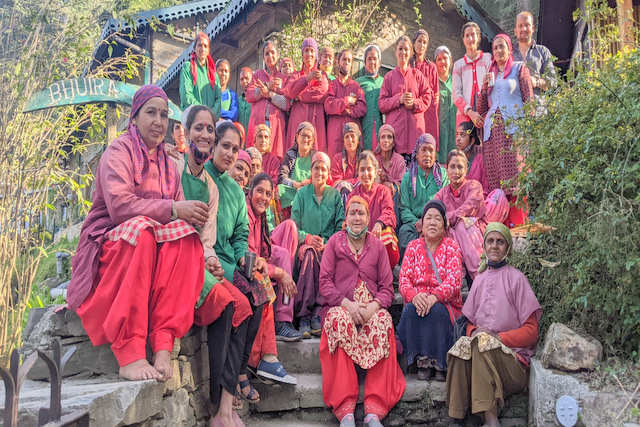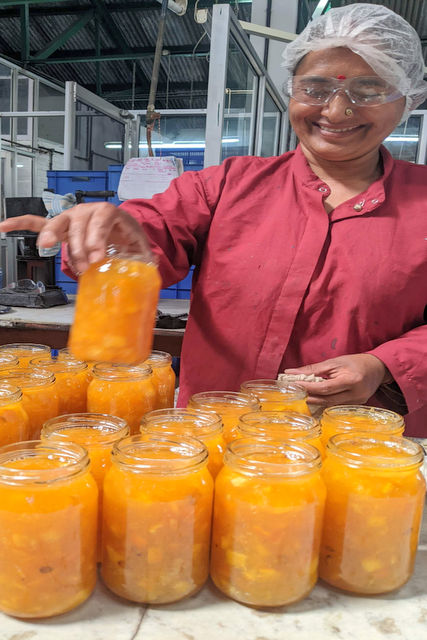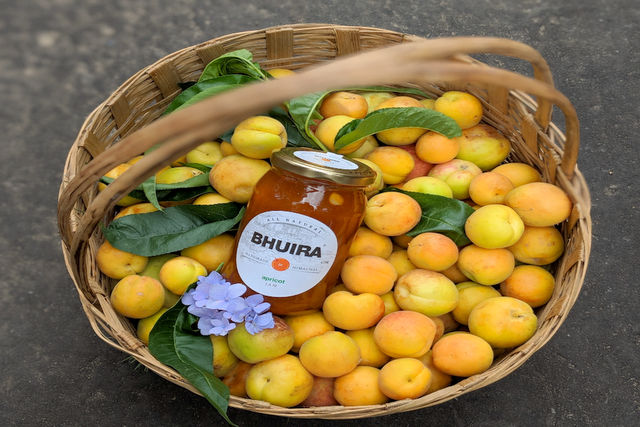On the way to Chandigarh from Shimla with my family, my father decided to visit the Bhuira Jams factory, located at Rajgarh in the district of Sirmour in Himachal Pradesh. Rajgarh is known as the peach bowl of Asia. About 6,000 metric tonnes of peach fruit are grown here spread over a 3026.29-hectare area. From Solan, we took a diversion to Rajgarh. It took about 2 hours to reach the destination.
Bhuira Jams – An Enterprise By Mountain Women Of Sirmaur
We had to take help from the locals as google maps were not helpful. Upon reaching we found a little cottage sort of factory, an office cabin. The owner’s home is located amidst deodar trees.

When I say the word factory it sounds like something in an industrial area. But surprisingly this jams processing unit was in the middle of pine trees emitting the traditional mountain vibes. The factory does not look like an actual factory. But a green-colored old store. We were lucky enough to meet the founder Linnet Mushran, the face behind the enterprise.
Woman Behind Bhuira Jams
Linnet Allfrey was born in New Zealand to a German mother and British father and was raised in the United Kingdom. Linnet met Kashmiri boy Vinay Mushran in Scotland during their college times. They fell in love with each other, decided to get married, and came to India. After their marriage, Linnet enjoyed settling down in Indian culture. She learned the Hindi language and became fluent in it. She started wearing Indian clothing like a saree.
Linnet tried every method to fit in between her in-laws, she would tan herself and learn to make Kashmiri food. She lived mainly on the outskirts of Mumbai, the jungle of Bihar where her husband Vinay was employed. Once they visited Himachal and fell in love with the cottage in Bhuira village where Vinay’s uncle lived. It was love at first sight for the village and she made it her second home.

Apple Orchards
The cottage was surrounded by apple orchards. Many apples fell naturally due to the strong wind. Which led to the wastage of apples. As they were slightly damaged and not suitable for the market. Linnet collected dropped apples and made jelly by using a traditional recipe that her grandmother and mother used. Everyone loved the idea of the preservation of fruits in the form of jelly and jams. Then, she asked for help from the local women in processing the jams in return for some money.

Linnet went to Kasauli to her friend’s shop with 100 Jam jars to be sold. On the weekend she got a call that conveyed all her Jam jars were sold. She was overwhelmed by such a positive response. That’s how the enterprise was born. Since 2010 her daughter-in-law Rebecca Mushran hailing from a management and confectionery production background has been the new face of the popular product.
Women Driven Enterprise
Linnet observed women in rural areas are dependent on their families for everything. She knew the importance of self-independence and wanted them to be one. She asked them to work for her and in return, she would pay them. At the start, 10 women helped her. Now more than 100 women are employed in product making. Women here not only work in factories but also manage all accounts. Women here work on computers and laptops despite many of them having just studied till the 5th standard. That’s why it’s a woman-driven enterprise. Every woman of Bhuira village is happy to offer her help.
Read more – Apple Out To Prosperity – Story Of Himachal Apple
Processing unit
Seasonal fruits are bought from local farmers directly from their fields. Linnet observed farmers aren’t paid enough in Mandis or markets. Also, the transportation costs are high so she bought fruits directly from orchards at the mandi rate from the local farmers. Some fruits like cherries, apricot, plums, etc are given more preference.

When I visited the factory, there were only limited flavors. But now you will find nearly 48 varieties of jams. The seasonal Blackberry jam, Tomato chutney, Strawberry Preserve, Bitter Orange Marmalade, Black Cherry Preserve, Apricot jam, and Kashmiri Bichua mango chutney are some of the top sellers of Bhuira jams. Cinnamon and Apple Jelly are my personal favorite. Marmalade is similar to jellies but it is made out of citrus fruit juice and peels. Most commonly bitter orange, lemon, and grapefruit are used in making marmalade.
Kashmiri spices are used in the making of Bhichua mango and Tomato chutney. Apple jellies are considered Bhuira’s signature product. Apart from jams, they make jellies, chutneys, and marmalade. The seasonal blackberry jam, tomato chutney, Strawberry Preserve, Bitter Orange Marmalade, Black Cherry Preserve, Apricot jam, and Kashmiri Bichua chutney are some of the top sellers

As demand for their products has doubled, a second processing unit was also set up. Both the units are absolutely hygienic. Workers ensure hygiene in the processing unit by wearing gloves and hair caps.
Process
First, fruits are washed and then de-seeded for the further procedure of making jams and jellies. No preservatives are added, It has an all-natural taste of fruit. No synthetic food color is used in Bhuira products. Nowadays people are health conscious and do not prefer adding sugar to their diet. So the demand for sugar-free jams reached the enterprise. In the sugar-free category strawberries and marmalade are included. Sugar is replaced with Apple and pear juice concentrate.

It wasn’t easy to set up a factory on hills, Linnet faced several obstacles. Being in a rural area the factory faced an electricity shortage. This meant there was not enough cold storage to preserve seasonal fruits. The hard work and determination of Linnet and her team overcame all the obstacles. Today they are recognized as the first artisanal jam maker in India. “I was never a businesswoman,” says Linnet. “It was the adventurous journey and the thought of serving these women stay self-sustaining that’s kept me going.”
They were one of the small business units which were fully functioning during the pandemic in India.
Read More – Popular Delicacies Of Kumaon Cuisine, Uttarakhand
Bhuira has completed 23 years of manufacturing and purchases 200 tons of fruits annually and 1000 kg capacity of manufactured jam per day. Bhuira Jams have impacted 400 families, and 40 cities pan India.
Where to buy Bhuira Jams

During earlier times it was difficult to find Bhuira Jams in the market. Only a few shops were having this product. Whenever I visited some shops and saw their jams. I felt nostalgic about my visit to the factory. As usual, everything is going digital and online. With a click, we can order anything just by being in our comfort zone. So now it is easy to buy Bhuira online from their own website.
They are also available on Amazon and other online platforms like SimpliNamdhari, CostBo, Big Basket, and retail brands such as Fabindia, Pepperfry, and others. They are also using social media platforms like Instagram effectively to reach out to their customers.
This post is written by Pallavi Thakur as part of the IndiTales Internship Program. Images provided by the owners of the brand. IndiTales is an affiliate of Amazon.














Amazing
Very good information about “BHUIRA JAMS “
Amazing post ,Nice information regarding Bhuira Jams. Thanx for sharing.
These women need more support and business to enhance their earning.
Thanks for empowering them
Very nice and Knowledgeable